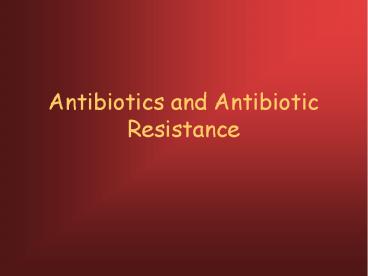Antibiotics and Antibiotic Resistance - PowerPoint PPT Presentation
Title:
Antibiotics and Antibiotic Resistance
Description:
Antibiotics and Antibiotic Resistance When were antibiotics discovered? Antibiotics and Antibiotic Resistance When were antibiotics discovered? 1928 by Alexander ... – PowerPoint PPT presentation
Number of Views:610
Avg rating:3.0/5.0
Title: Antibiotics and Antibiotic Resistance
1
Antibiotics and Antibiotic Resistance
2
When were antibiotics discovered?
1928 by Alexander Fleming Penicillin
Fleming receiving Nobel Prize in 1945
3
What did people die from in early 1900s?
Mostly infectious diseases many caused by
bacteria
Thanks to mass-production of antibiotics ?
4
How common is the use of antibiotics?
- 1998, 80 million prescriptions filled in U.S.
(12,500 tons) - Additional 18,000 tons due to use in farm
animals
5
So what happens with lots of antibiotic use?
Bacteria become resistant to antibiotics
(70 of bacteria which cause infections in
hospitals are resistant to at least one
antibiotic)
6
How big of a problem are antibiotic-resistant
bacteria?
In 2005, more people died from MRSA (a multiple
antibiotic-resistant bacteria) than from AIDS.
Most are connected with a hospital stay, but 15
occurred in people with no known health risk.
7
How do bacteria become antibiotic-resistant?
Natural Selection
- Genetic variation.
- Overproduction of offspring.
- Competition for resources.
- Those that survive can pass on genes.
8
How can we slow the development of
antibiotic-resistant bacteria?
- Dont take antibiotics for a viral infection.
2. Take entire prescription.
3. Dont save antibiotics.
4. Dont use somebody elses medication. (old
not correct dose)































